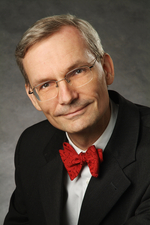Michael F. Feldkamp (born 23 April 1962) is a German historian and journalist.
Contents
- Career
- Honours
- Works available in German
- Works available in Italian
- Works available in Spanish
- Works available in French
- References
- External links

Michael F. Feldkamp (born 23 April 1962) is a German historian and journalist.

Feldkamp was born in Kiel. After completing his high school studies at the Gymnasium Carolinum in Osnabrück, he studied history, Catholic theology, teaching, and philosophy at the University of Bonn. During the academic year 1985-1986 he studied Church history at the Gregorian University in Rome. He concluded his studies with the German state examination in 1990. In 1986, and again in 1990-1991, he received fellowships from the German Historical Institute in Rome. The University of Bonn awarded him the Dr. phil. degree in 1992. From 1993 to 1995 he was on the staff of the archives of the German Bundestag (Parliament). From 1996 to 1997 he worked in the Bonn antenna for the Institute for Contemporary History in Munich. In 2000 he was given a permanent civil service appointment in the administration of the Bundestag.
Feldkamp is a member of the Roman Catholic fraternity Katholischer Studentenverein Arminia Bonn and the Katholischer Studentenverein Askania-Burgundia Berlin , the two founder fraternities of the Kartellverband katholischer deutscher Studentenvereine . Feldkamp's research is wide-ranging. In addition to numerous articles about the history of the diocese and province of Osnabrück, he has studied papal diplomacy and the Cologne nuntiature, and written about university history and the history of scholarship. He is best known outside Germany for his writings about the role of Pope Pius XII during the Third Reich. So he has critically analysed "Hitler's Pope" by John Cornwell and A Moral Reckoning by Daniel Goldhagen. Within Germany, he has achieved recognition for his studies of the German "Basic Law" (Constitution) and the history of the Bundestag. In 2012, the German publisher Wolfram Weimer counted Feldkamp to the 800 most important representatives of modern Catholicism in Germany due to his scientific and journalistic commitment. [1] Feldkamp became a member of the papal order of St. Gregory the Great in July 2021 with the office of commander. The honor was awarded in the apostolic nunciature in Berlin. [2]
In January 2022, Feldkamp presented in the Vatican his latest research on Pius XII in relation to the Holocaust, thereby contradicting with evidence what John Cornwell wrote in his book "Pius XII - The Pope Who Remained Silent" and claiming that Pope Pius XII saved more than 15,000 Jews from extermination. [3]